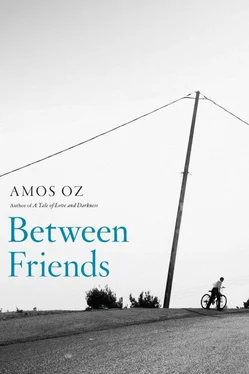Roni Shindlin and his tablemates sometimes laughed raucously, and the kibbutz members did their best not to become the butt of their jokes.
At ten at night, Roni and his gang dispersed to their apartments, and he would stop in at the children’s house to check on Oded and tuck him in. Then he’d trudge home, sit down on the steps to take off his shoes so as not to track in the mud, and tiptoe inside in his stocking feet. Leah would be sitting there, chain-smoking, listening to the radio. She listened to the radio every night. Roni would also light up, his last cigarette of the day, and sit down across from her without speaking. At ten thirty, they put out their cigarettes, turned off the light, and went to sleep, he wrapped in his blanket and she in hers, because they had to get up before six in the morning for work.
In the metalwork shop, Roni was known to be a hard worker devoted to his job, and he also never missed a meeting of the Farm Management Committee, where he was always on the side of those who supported careful, balanced management of the agricultural divisions and opposed potentially reckless initiatives. He voted for a limited expansion of the chicken coop but against taking bank loans.
He had a stamp collection that he pored over with Oded every day after work: they would sit with their heads bent, almost touching, over the coffee table, the room warmed by a kerosene heater that burned with a blue flame. With water from a small bowl, Oded would wet the pieces of envelopes that bore the stamps in order to melt the glue and separate them from the paper. Then, under his father’s supervision, he’d place the stamps face-down on a piece of blotting paper to dry. As Roni arranged the stamps in an album, following the English catalog, he would explain to Oded about Japan, the land of the rising sun, about the freezing country called Iceland, about Aden and the ancient Hazarmaveth, the Courtyard of Death, near the Strait of Tears, about Panama and the large canal that had been dug through it.
Leah squeezed fresh orange juice for them, admonishing Oded to drink it all, then she sat down in her corner and read an education journal. Every now and then they heard a faint burbling from the pipes of the kerosene heater, and the flame behind the iron grate flared up momentarily. Outside, the rain and wind pounded the closed shutters, and the branch of a ficus tree brushed against the outer wall again and again as if begging for mercy. Roni stood up, emptied the ashtray, and rinsed it under the tap. Oded sucked his thumb and clung to his father. Leah scolded him, “Stop sucking. And, you, stop spoiling him. He’s spoiled enough as it is.” Then she added, “He’s better off eating an orange instead, and he should get rid of that pathetic duck of his. Boys don’t play with dolls.”
Now that Leah had gone away for ten days, Roni went to the children’s house every afternoon at four o’clock to pick up Oded and his squealing duck. With the boy astride his shoulders, he’d stroll around the cow barns and chicken coops. The acrid smell of rotting orange peel rose from the compost pile, mingling with the heavy stench of animal feed and wet manure from the barn. A damp wind blew in from the west, and an early twilight fell on the storerooms and sheds and enveloped our small, red-roofed houses. Now and then a bird chirped piercingly in a treetop and the sheep in their pen replied with a heartbreaking bleat. Sometimes it began to drizzle, and father and son hunched over and hurried home.
At home after their stroll, Roni coaxed Oded into eating a slice of bread and jam and drinking a cup of cocoa. Oded reluctantly nibbled two or three bites of bread, took a sip of the cocoa, and said, “No more, Daddy. Now stamps.”
After Roni had cleared the table and put the dishes in the sink, he took down the green album and the two of them bent over it, heads almost touching. Roni lit a cigarette and explained to Oded that stamps are small visitors from distant countries, and each visitor is here to tell us a story about its homeland, its countryside and famous people, its holidays and beautiful buildings. Oded asked if there were countries where children are allowed to sleep with their parents at night and where children aren’t mean and don’t hit. Roni didn’t know how to answer, so he just said that there are good people and cruel people everywhere, and explained the word cruel to Oded. In his heart, Roni believed that, here, cruelty is sometimes disguised as self-righteousness or dedication to principles, and he knew that no one was completely free of it. Not even he himself.
Oded grew anxious as seven thirty approached, the hour he had to go back to the children’s house and leave his father for the night. He didn’t plead to stay at home, but instead went to the toilet to pee, and when he didn’t come out, Roni had to go in after him and found him sitting on the closed toilet, sucking his thumb and hugging his rubber duck, its once-red bill now faded and one of its eyes slightly sunken into its head.
Roni said, “Dedi. We have to go. It’s late.”
Oded said, “We can’t, we just can’t. There’s a big wolf in the woods.”
Finally they both put on their coats. Roni helped Oded into his green boots and tied the strings of his hat under his chin. He took a large, thick stick from behind the steps for chasing away the wolf, held Oded in his arms, and walked to the children’s house. The boy hugged his father’s head with one hand, and in the other he held the duck so tightly that it emitted a constant stream of faint squeals. When they passed the grove behind the dining hall, Roni waved his stick, striking the wet air every which way until the wolf ran off. Oded thought about that for a moment, then said sadly that the wolf would come back late at night when the parents were asleep. Roni promised that the night guard would chase away the wolf, but the boy was inconsolable because he knew very well that the wolf would devour the night guard.
When they reached the children’s house, the electric heater was already on in the dining room and there were plates on the small tables, each filled with a slice of bread and yellow cheese, half a hard-boiled egg, tomato slices, four olives, and a small mound of cream cheese. The caregiver, Hemda, a dumpy woman wearing a white apron around her waist, made sure that the children placed their boots in a neat row by the door and hung their coats on the wall hooks above their boots. Then the parents went outside to smoke, the children ate and took their plates and cups to the sink, and the monitors wiped the tables.
After the meal, the parents were allowed to go in and put their children to bed. The children, in flannel pajamas, gathered around the sinks, screamed and pushed each other, washed their faces and brushed their teeth, and climbed noisily into bed. The parents were given ten minutes to read them a story or sing them a lullaby, then they said good night and left. Hemda turned off the lights, except for a small one in the dining room. She stayed for several more minutes, forbade the children to whisper, ordered them to go to sleep, gave them another warning, said good night, leaving a dim light on in the shower room, turned off the electric heater, and left.
The children waited until she was gone, then got out of bed barefoot and began to run around the bedrooms and the dining room. They hurled their muddy boots at each other, growing rowdier by the minute. The boys wrapped blankets around their heads and frightened the girls by roaring, “We’re Arabs, we’re attacking now.” The shrieking girls huddled together, and one of them, Atida, filled a bottle with water and sprayed the Arabs. The mayhem didn’t end until Eviatar, a broad-shouldered boy, suggested, “Hey, let’s go and snatch Oded’s duck.”
Читать дальше












